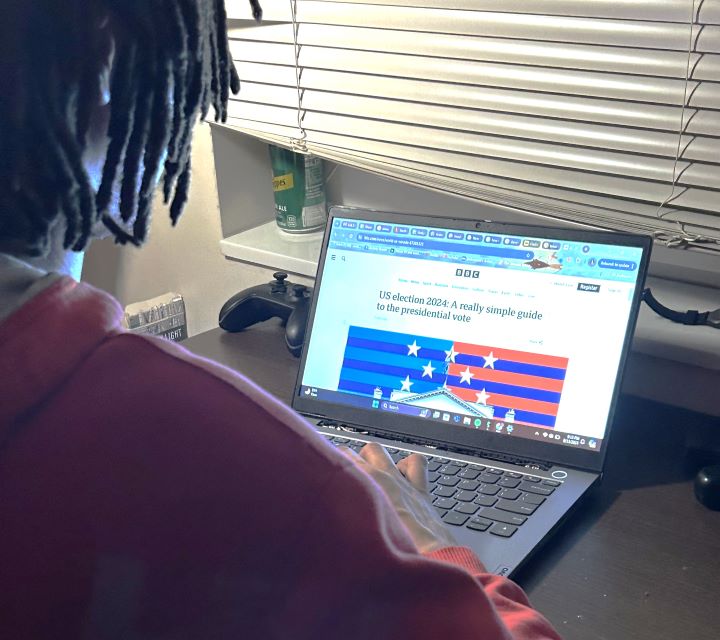Sarai Murdock
The Cleveland Observer
With the presidential election fast approaching, Gen Z voters are stepping into the political spotlight, many casting their first votes for president this November. As the race heats up, the key questions on everyone’s mind are: what do first-time voters think, and how will they shape the election? Conversations have centered around the possibility of the U.S. electing its first female president, third-party candidates, and Project 2025.
Following President Joe Biden’s announcement that he would not seek re-election, Vice President Kamala Harris has taken his place at the top of the Democratic ticket, facing off against former President Donald Trump, the Republican frontrunner. As Election Day nears, young voters are weighing their options.
“I think it could really be anyone’s game at this point. But people are hoping that Kamala wins,” said 21-year-old Andrew Easterling, a Cleveland State University senior studying film. Though he has voted in local elections since turning 18, this will be his first presidential vote. As an independent voter, Easterling is focused on electing a candidate who can benefit the Black community and address inflation.
“Kamala has made a lot of promises, and I hope she sticks to them. I’d feel hopeful if she became president,” Easterling added.
Ryan Lawson, 21, returned to Cleveland after attending Columbia College in Chicago. He’s now taking a gap year to build his finances and network. For Lawson, this will be his first time voting in any election. While he sees Harris as potentially more in touch with everyday people than her political peers, Lawson feels disillusioned by the two-party system.
“I think the current system is flawed. Everything focuses on the two main parties, Republican and Democrat, but there are always more candidates running,” Lawson said, echoing a common concern among young voters.
In addition to Harris and Trump, several third-party candidates have entered the race, including Cornell West running independently, Jill Stein for the Green Party, Chase Oliver representing the Libertarian Party, and Claudia De la Cruz for the Party for Socialism and Liberation.
Lawson is particularly wary of another Trump presidency, citing the former president’s response to the Black Lives Matter protests in 2020 after George Floyd’s death. Trump’s tweet, “When the looting starts, the shooting starts,” during the protests left an impression on him.
“Trump had his chance, and it was scary to see what he did. I don’t want to go back to that. Some of his actions were really questionable, and it felt like he used his power to get away with things,” Lawson said.
For 19-year-old Zarriana Price, a first-time voter who registered the day after her birthday, the idea of Trump’s potential return to the White House brings a sense of unease.
“Minorities are scared of Trump being president again, especially after the whole Project 2025 thing,” Price said, referencing concerns about a conservative policy agenda being rolled out should Trump win a second term.
Price, who is currently on a gap semester focusing on work, admitted she’s not deeply political but believes staying informed is important. She also expressed skepticism about voting merely to prevent someone else from becoming president.
“People vote to avoid having a certain candidate, but they don’t even look at what the other person offers,” she noted.
According to The Center for Information & Research on Civic Learning and Engagement (CIRCLE), Gen Z will make up over 40 million potential voters in 2024, including eight million new voters who’ve reached voting age since 2022. This demographic alone will represent nearly one-fifth of the American electorate, and when combined with younger Millennials, they could become a powerful force in the election.
Last year, CIRCLE, in partnership with Action for the Climate Emergency (ACE) and Climate Power, surveyed 2,017 U.S. citizens between 18-34. The results revealed that 57% of respondents are “extremely likely” to vote, with 51% identifying as Democrats. Their top concerns include the economy, the environment, and gun violence.
Lawson shares many of these concerns, particularly regarding gun control. “If anyone’s willing to even try to change our gun laws, that’ll be a good idea, but education is important too,” he said.
Easterling and Lawson both view the economy and gun violence as critical issues, while Price’s main concern is the effectiveness of the government in addressing these problems.
As the 2024 election unfolds, these first-time Gen Z voters will play an increasingly important role in shaping the nation’s future. With a unique set of priorities and concerns, their voices are sure to be heard at the ballot box.





